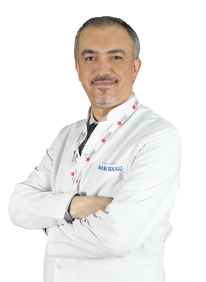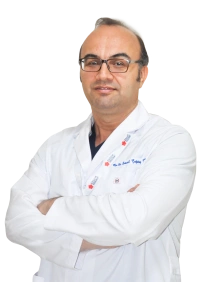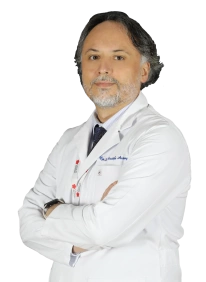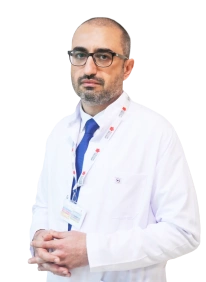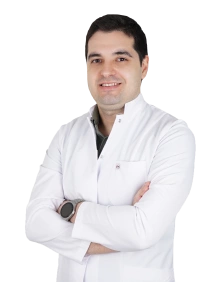General Surgery
What is General Surgery?
General surgery is a discipline which focuses on many systems in body for example endocrine system (thyroid, parathyroid, adrenal gland), digestive system (esophagus, stomach, small and large intestines, pancreas, liver, bile duct system), breast diseases, trauma and burns, and ensures the medical or surgical treatment of disorders occurring in these systems.
In the hospital, all operations in the area of general surgery are performed by a medical team consisting of experienced surgeons and anesthetists with the world-class technical equipment.
Diseases of General Surgery Department
- Obesity and endocrine diseases
- Thyroid diseases
- Breast diseases
- Benign and malign tumors of the breast
- Esophagus diseases
- Esophagus cancer
- Benign tumors such as diverticulum etc.
- Gastric diseases
- Gastric hernia, diaphragm hernia
- Gastric cancer
- Benign tumors of the stomach
- Ulcer and stenosis at the gastric outlet
- Small bowel obstructions
- Intestinal hernia
- Hemorrhoids
- Ingrown hair
- Gallbladder and biliary tract diseases
- Appendicitis
- Pancreatic tumors
- Colon tumors
- Rectum tumors
- Abdominal wall and inguinal hernia
- Post-surgical hernias
- Anal abscess, anal fissure, anal fistula
- Adrenal tumors
- Abdominal wall tumors
- Liver tumors
- Cystic diseases of the liver (hydatid cyst etc.)
- Scalp and skin cysts and benign tumors
General Surgery Branches
Laparoscopic Surgery
Laparoscopy: Laparoscopy monitors the intra-abdominal area with an optical device. This device is inserted through an incision in the intra-abdominal area. By illuminating intra-abdominal area, laparoscopy ensures to directly observe the diseases or disorders related to uterus, ovary and ovary tubes and, when required, administer the treatment with the ancillary tools inserted through holes of 3-5 mm in lower abdominal area.
Thanks to the laparoscopic surgery, many complications were minimized and patients' postoperative recovering periods were shortened as much as possible.
Laparoscopic surgery is performed in our hospital with advanced technical equipment.
Laparoscopic gastric cancer, colon cancer and rectal cancer operations: In our hospital, laparoscopic gastric cancer, colon cancer and rectal cancer operations are performed with all our technical equipment.
Laparoscopic anti-reflux surgery: Gastroesophageal reflux is a significant condition characterized by serious clinical symptoms arising from the reverse flow of gastric acid or alkali content to esophagus.
Laparoscopic hernia surgery: Laparoscopic inguinal and umbilical hernia operations are frequently performed through TAPP and TEPP methods by the General Surgery Department.
Laparoscopic appendectomy (appendicitis): In the General Surgery Department, diagnostic laparoscopy and laparoscopic treatment of acute appendicitis are performed.
Laparoscopic cholecystectomy (gallbladder): In our hospital, standard laparoscopic cholecystectomy and S.I.L.S. (Single Incision Laparoscopic Surgery) are successfully performed.
Apart from these, laparoscopic spleen and adrenal (suprarenal gland) operations are performed.
Endocrine Surgery
In our endocrine surgery department, surgeries are performed for neuroendocrine tumors of the parathyroid gland, adrenal gland, gastrointestinal and pancreas.
Gastroenterology Surgery
In gastroenterology surgery, surgical treatment of all digestive system organ diseases from the esophagus to the anus (such as esophagus, stomach, duodenum, small-large intestine, anus, liver) is performed by a general surgeon. Surgical procedures such as polypectomy etc. are performed by gastroenterologists.
Obesity and Metabolic Surgery
In obesity and metabolic surgery, obesity and metabolic diseases that occur for multiple reasons are treated with surgery.
Obesity, which causes many health problems, is treated by experienced general surgery specialists in our hospitals with sleeve gastrectomy, gastric bypass, gastric balloon and stomach botox methods. It is very important for the patient to fulfill the directives given to him before and after the surgery for the success of bariatric surgery.
Metabolic surgery is used in the surgical treatment of diabetes, which is increasing all over the world. In patients with type 2 diabetes, first of all, medical treatment is tried, but when this treatment fails, metabolic surgery comes into play. In metabolic surgery, two methods are restrictive and malabsorption; tube stomach and gastric bypass procedures are performed.
Pelvic Floor Surgery
The muscle layer that covers the inside of the pelvis and supports the uterus, bladder and the last part of the large intestine is called the pelvic floor. When the pelvic floor muscle weakens due to advanced age, multiple births, difficult births, previous surgeries, excess weight and chronic cough, it causes a series of problems, including sagging in the organs, urination and defecation disorders.
After the diagnosis is made as a result of detailed examinations and tests, surgical and non-operative methods are applied for treatment.
Non-surgical treatment methods;
- Nutrition regulation
- Weight control
- Kegel exercise
- It includes medical treatments.
If necessary;
- Rectal Prolapse (prolapse of the large intestine outside the anal region)
- Rectocele (prolapse of the last part of the large intestine into the birth path)
- Cystocele (prolapse of the bladder into the birth canal
- Enterocele (prolapse of the small intestine into the birth canal)
Surgery is planned for their treatment.
While performing pelvic floor surgery, other surgeries can be added according to the patient’s age and the condition of sagging organs.
Inflammatory Bowel Disease Surgery
In our general surgery department, surgical treatment of diseases called inflammatory bowel diseases (ulcerative colitis, Crohn's disease) is performed.
In people with Crohn's disease;
- Inadequate drug therapy
- Intestinal stenosis,
- Proliferation of abscesses and fistulas,
- Bleeding or perforation in the intestine,
- Bowel obstruction
If the complaints above are seen, surgical treatment can be applied.
In people with ulcerative colitis;
In people with ulcerative colitis;
- Massive and non-reducing bleeding
- Toxic megacolon at risk of perforation
- Fulminant acute ulcerative colitis unresponsive to medical therapy
- Intestinal obstruction due to stricture
- Presence or suspicion of colon cancer
- Systemic complications
- Uncontrollable disease
If complaints above are seen, surgical treatment can be applied.
Botox applications in the anal area
Botox, which has been used for therapeutic purposes in many areas, is also used in anal diseases. Because botox can prevent the muscles movement, relaxation is observed in the muscles around the anus and the tension in the muscles is reduced. Through the resolution of the anal spasm, the blood flow in the area increases and the anal fissure starts to heal naturally thanks to botox. It is among the non-surgical solution options with satisfactory results in suitable patients. Botox treatment can also be used in the treatment of other functional pelvic floor diseases such as Levator Ani syndrome and anismus.
Laser Treatment in Anal Diseases
By laser treatment, which is one of the non-surgical treatment methods, the healing process is easier and faster since there are no open wounds. In our general surgery department, laser treatment is applied for hemorrhoids, anal fistula and ingrown hair problems in eligible patients.
Other procedures by our department
- Rectal prolapse
- Rectocele
- Gastroscopy
- Colonoscopy
- Endoscopy
FREQUENTLY ASKED QUESTIONS
Is surgery required for thyroid nodules?
Thyroid nodules form in the thyroid gland and are filled with fluid or solid tissue. Surgery is not always required for thyroid nodules, which are quite common in our country;
- If it is disturbing the person aesthetically,
- If the ocular findings are advanced in Graves' disease,
- In nodular goiter, if the thyroid is over-functioning (if there is toxic goiter),
- If thyroid hormones are normal in nodular goiter, but cancer is suspected in the nodules,
- If rapid growth is detected in the nodules, surgery is required.
What is thyroid cancer?
Thyroid cancer is a disease that results from the transformation of the thyroid gland cells into cancer. This type of cancer is seen either as a mass in the neck or as a nodule in the thyroid gland. Among the nodules in the thyroid gland, the nodules not secreting hormones have a higher risk of turning into cancer and they should be followed up.
The most effective method in the treatment of thyroid cancer is the surgical approach. In our general surgery department, after the diagnosis of thyroid cancer is made, the condition of the lymph nodes in the neck region is checked with a detailed evaluation in order to make a surgical treatment plan. If the size of the mass is less than 1 cm, even removal of one half of the thyroid organ (lobectomy) may be sufficient in early cases. However, if the size of the mass is large, removal of the entire organ (thyroidectomy) is the recommended surgical method.
What is breast cancer?
Breast cancer is the condition when the cell groups in breast tissues change over time, reproduce in an uncontrollable way and get tumorous. The most common type of cancer in women is the breast cancer. Breast diseases are treated by general surgery.
In breast cancer, cancerous cells are usually found in the milk drainage ducts of the breast. Breast cancer, which is mostly seen in postmenopausal women, can rarely occur in young people. In addition, breast cancer can be seen not only in women, but also in men, albeit at a very low rate.
How is breast cancer surgery done?
In our general surgery department, breast cancer surgeries are determined according to the stage of the cancer.
- Breast-conserving surgery is recommended first in early-stage breast cancer because it is important to protect the breast and armpit from excessive surgery. If conservative surgery is not sufficient, mastectomies that will protect the skin and/or nipple are preferred. Regardless of the breast surgery method, in axillary lymph node surgery, first of all, the sentinel lymph nodes are investigated, and then the remaining lymph nodes are removed if necessary.
- In advanced stage, that is, metastatic breast cancer; when the desired result cannot be obtained after radiotherapy and chemotherapy, breast and armpit surgery is performed. Mastectomy operations can be performed in patients who respond to systemic treatments and in patients who experience local problems (breast infections, non-healing wounds, bleeding).
What should be considered after goiter surgery?
The recovery period after goiter surgery does not take long, patients can recover quickly. However, after the surgery, voice changes such as hoarseness, difficulty speaking loudly, voice fatigue and changes in tone may be experienced. These symptoms may persist for several days or weeks; but they are not permanent.
After the operation, incision areas should be paid attention for a while. Depending on the dressing, activities such as bathing and swimming may not be possible before healing. In the process when the neck is stiff and painful, it is more appropriate to eat soft and easy-to-swallow foods.
Who performs hemorrhoid surgery?
Hemorrhoids surgery is performed by general surgeons. While surgery isn’t usually preferred for 1st and 2nd stage hemorrhoids, surgical operation is performed in 3rd and 4th stage hemorrhoids where the symptoms are severe.
Hemorrhoid surgeries in our hospitals are performed by the Doppler, arterial ligation (HAL) and laser methods.

